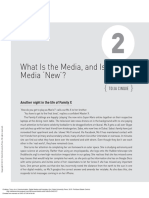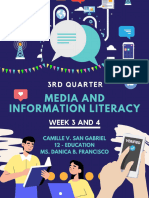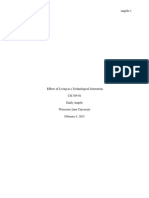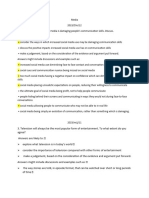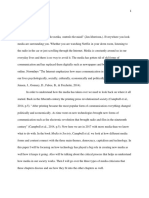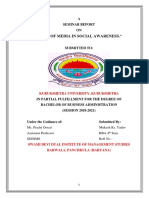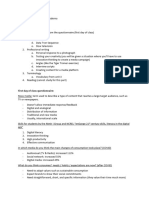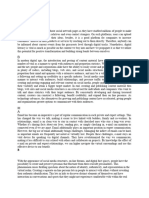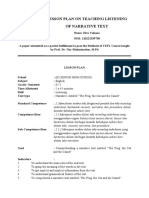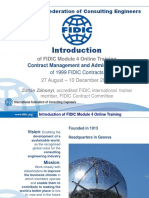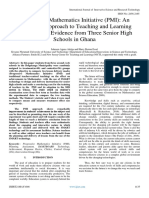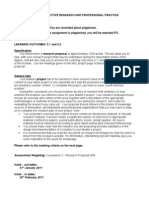Plagiarism Report
To be attached to the front of the assessment.
Faculty: Bedfordview
Lecturer’s Noko Mojela
Name:
Module Code: MSMSA1
Assessment Formative assessment
Name:
Programme: Media Studies
Student Full Joyce Lethabo Masego Kgoadi
Name:
Student EDUV4937806
Number:
Date: 2025/03/11
Description of plagiarism:
1
�Lecturer name: Noko Mojela Lecturer signature:
Student Name: Lethabo Student Surname: Kgoadi
ASEM Name: ASEM Surname:
Outcome:
Individual Assessment Coversheet
To be attached to the front of the assessment.
Campus: Bedfordview
Faculty: Humanities
Module Code: MSMSA1
Group: 1
Lecturer’s Noko Mojela
Name:
Student Full Joyce Lethabo Masego Kgoadi
Name:
Student EDUV4937806
Number:
2
� Indicate Yes No
Plagiarism report attached YES
Declaration:
I declare that this assessment is my own original work except for source
material explicitly acknowledged. I also declare that this assessment or
any other of my original work related to it has not been previously, or is
not being simultaneously, submitted for this or any other course. I am
aware of the AI policy and acknowledge that I have not used any AI
technology to generate or manipulate data, other than as permitted by
the assessment instructions. I also declare that I am aware of the
Institution’s policy and regulations on honesty in academic work as set out
in the Conditions of Enrolment, and of the disciplinary guidelines
applicable to breaches of such policy and regulations.
Signature: LKG Dat
eJH
Lecturer’s Comments:
Marks Awarded: %
Signature Dat
e
3
�TABLE OF CONTENTS
Cover page 1-2
Plagiarism report 2–3
Table of contents 4
Introduction 4-5
Themes 5-7
Conclusion 7
Bibliography 8
Appendix A – mediagraphy 8 - 12
Appendix B – questionnaire 12 - 14
Introduction
Who run the world you might ask…? You probably thought girls, right? Wrong, but
that’s ok, Beyonce thought the same thing. ‘This new device will change your life’,
‘go from being broke to woke using this…’ or ‘your skin will thank you later if you try
this’ I mean the list goes on and on. Who am I talking about? The one who really
runs our world. A digital platform based on multiple technologies brought together to
shape our thoughts, ideologies and our custom of living [O] (Paljug, 2025) and her
4
�name is social media. So, with all that being said, this is how she has contributed to
who I am today.
Why I prefer digital media
My daily average screen time is approximately five hours, shared between many
sources and apps such as Tik Tok and Instagram. The media that I consumed the
most was the Internet because it is my main source of entertainment and a site that I
can obtain any type of knowledge that I want. This experiment made me realize how
out of tune I am with the real world. Because of how digitalised this generation has
become, it feels ‘easy’ and convenient to just google what I want or watch it online,
rather than going out of my way to gain access to newspaper articles and watching
the news on TV, which is most probably why my least consumed media was books.
Not only is it easily accessible, but digital media is way more cost effective and
engaging [O] (Price, 2025). So, we can converse with one another regardless your
geographical position.
What media meant to my father
Now compared to my interviewee, our media consumption is the complete opposite.
Talking to my interviewee (dad) about what the media meant to him back then to
what it means to him right now made me appreciate the epoch of life that I was born
into. According to him, media back when he was about my age was only limited to
certain type of people. Even on occasions where they were even lucky enough to fed
information and news, it was very vague and sometimes false to refrain the black
community from being the least bit intelligent.
So that’s why after democracy, when media became free and accessible to all, my
father took it upon himself reinvent his identity. From reading newspaper articles and
books, to listening to the radio and being able to engage with different people and
expanding his knowledge. It didn’t matter to him that news was a lot less accessible
and more cost effective. Anything to help build his confidence in understanding how
5
�the world around him operated and the rapid changes that are to come. That’s why
my dad truly believes that “knowledge is power” (Mandela) because to them,
education mattered. It defined you, your status and the value that you held, which is
why until this day, he still believes in books and hard copy articles. In his words:
“traditional news is a lot more reliable and truthful than digital print because anyone
can just wake up and fabricate their own story and rest of the world will believe it,
whereas in our time, news was relevant, and fact based. No one could say just what
they wanted to say. If it was inappropriate and irrelevant, it most probably wouldn’t
make it in the print. Especially if it wasn’t credible.”
Similarities in our media consumption
Though we come from different generations, we still do share similar views on the
media. Starting with the credibility of digital media. Social media reporters tend to not
use precautionary measures when publishing news. News reporting in this day and
age is more focused on the “views” and the “likes” by pushing out content that they
know will have readers hooked just to “secure the bag” than vetting and proofreading
content that they post.
Another similarity that we share is not watching TV. Over the years, there has been a
lack of interest in watching TV in our household due to it slowly becoming irrelevant.
DSTV and decoders are now a thing of the past which makes having a TV pointless.
We both also found that digital media is a lot easier to comprehend when you watch
it rather than reading it, which not only makes you lazy, but you end up struggling to
analysis written work which was the upside with physical print. Readers were forced
to have a perspective on what they read to understand what was happening and to
expand their critical thinking.
Differences in our media consumption
The shocking and the embarrassing part of this experiment was finding out the
difference in our screen time. Even though my father’s uninterested in his phone and
I’m dependant on mine, still brings us to same the consensus… educated. The main
difference in our preference of media intake is the accessibility of it. Like I said
6
�before, digital print is a lot more time flexible and quicker to get your hands on
compared to traditional news where the paper has been printed first and then
distributed. So, the news is delayed. Digital media is also engaging and interactive.
This platform encourages viewers to comment, like, share and subscribe unlike
printed media which has linear communication, restricting readers to just consume
the media but have no say in it. Most traditional news is locally distributed and is
within reach to certain people depending on where you are located. Digital media is
global meaning that it can reach a large number of people at the same time.
What I think about this research assignment
I found our different definitions of media quite interesting. How media literally build
my father’s character and how his experience was so much more personal where I
see media mainly as my source of entertainment. I guess the question that I keep
asking myself is what is the actual point of digital media? Besides entertainment,
why do we need it? Because from what I see, the world was not only surviving, but
they were doing a whole better than we are today. Cyberbullying would not exist had
the internet not been invented, suicide rates would not be as hysterical as they are
today and most importantly media would actually matter like it did back then. Media
has also brainwashed us into thinking that life is not that serious. Not that deep at all.
I mean its gotten to the point where we can casually tweet and disrespect our
presidents as if they are our next door neighbours. But how far is too far?
Conclusion
Well, that’s the thing. There is no far. No boundary, no line, no wall. Just freedom.
Too much in fact, which is where the danger lies. I will always love the convenience
and cost efficiency of digital media, but is it worth it? I don’t think so. But what I do
think is that we need a break from it. All of it. So… petition to have social media
restricted?
Word count: 1145
7
�Bibliography
paljug, k., 2025. investopedia. [Online]
Available at: hhtps://www.investopedia.com
[Accessed 19 february 2025].
price, k., 2025. sessions college. [Online]
Available at: https://www.sessions.edu
[Accessed 13 january 2025].
trujillo, t., 2018. writing and reporting news you can use. 1 ed. new york: routledge.
DAY MEDIA CONSUMED TIME SPENT
1 WhatsApp 1 hour
Gallery 1 hour 15 minutes
Instagram 2 hours
Tik Tok 2 hours 15 minutes
YouTube 1 hour 45 minutes
2 WhatsApp 1 hour 20 minutes
Gallery 25 minutes
8
� YouTube 2 hours
Instagram 45 minutes
Tik Tok 45 minutes
Internet 1 hour
3 Internet 1 hour 20 minutes
Instagram 30 minutes
Tik Tok 1 hour
WhatsApp 50 minutes
Gallery 30 minutes
Google 15 minutes
YouTube 1 hour 15 minutes
4 Internet 30 minutes
WhatsApp 45 minutes
Google 15 minutes
Tik Tok 1 hour
Instagram 30 minutes
YouTube 20 minutes
Microsoft teams 4 hours
5 WhatsApp 45 minutes
YouTube 30 minutes
Google 15 minutes
Gallery 10 minutes
Instagram 45 minutes
Tik Tok 1 hour
9
� Internet 1 hour
Microsoft teams 2 hours
6 Internet 45 minutes
Google 35 minutes
WhatsApp 50 minutes
Gallery 20 minutes
Wattpad 1 hour 25 minutes
Microsoft teams 4 hours
7 Internet 1 hour 15 minutes
Google 20 minutes
WhatsApp 25 minutes
Gallery 15 minutes
Wattpad 1 hour
YouTube 1 hour 30 minutes
Microsoft teams 2 hours
8 YouTube 20 minutes
Google 10 minutes
WhatsApp 30 minutes
Internet 45 minutes
Gallery 15 minutes
9 Wattpad 1 hour
Google 15 minutes
WhatsApp 30 minutes
YouTube 1 hour
10
� Internet 1 hour 15 minutes
10 WhatsApp 1 hour
YouTube 1 hour 30 minutes
Internet 1 hour 15 minutes
Google 1 hour
Wattpad 2 hours 15 minutes
11 Instagram 1 hour
Tik Tok 2 hours
Internet 1 hour
Gallery 30 minutes
45 minutes
1 hour 45 minutes
WhatsApp
YouTube
12 YouTube 1 hour
Internet 45 minutes
Wattpad 1 hour
Books 1 hour 15 minutes
Google 1 hour
13 YouTube 45 minutes
Internet 1 hour 30 minutes
WhatsApp 1 hour
Wattpad 45 minutes
14 YouTube 45 minutes
11
� Gallery 30 minutes
Books 1 hour
WhatsApp 45 minutes
Internet 30 minutes
Wattpad 15 minutes
APPENDIX B
MY INTERVIEW
1. Q: Which media did I consume the most and why?
A: Internet was the media I consumed the most because this is where I gain
access to my shows and documentaries that I enjoy which I make sure to watch
almost every day.
2. Q: Which media did I consume the least and why?
A: Media that I consume the least are books because most resources that I use are
digital, so there is no need for me to read a book when I can easily access it
elsewhere.
3. Q: How is the media that I consume based on my social/ economic/
historical context?
A: On a social level, media has influenced how I interact with people. For me to be
accepted in a social setting, I must know certain trends and move with the times
otherwise I feel left out. Economically, many researchers and statisticians rely on
information passed on through the internet to make decisions in their businesses.
Historically, media has evolved from cave paintings to newspapers and radio and
now to digital communication. I can gain access to any type of information anywhere,
anytime whereas back in the day that was not possible.
12
� 4. Q: How is the media I consume currently shaping my identity?
A: Because of how much of it I consume, I can say that it is a part of me because
everything that I do, say and feel is based on how media portrays itself.
5. Q: How has my media consumption shaped me?
A: It has shaped my thought process and how I view and respond to news.
INTERVIEW: DAD
1. Q: Which media did you consume the most and why?
A: I consume radio the most because I enjoy listening to the news more than reading
or watching it and the best part about it is that I get news live when it’s happening.
2. Q: Which media do you consume the least and why?
A: Television mostly we don’t have one but also because I spend most of my time in
a car or at work and obviously a TV is not available in those places, you radio is the
best option because I can be aware of what’s happening no matter where I am.
3. Q: How is the media that you consume based on your social/ historical/
economic?
A: It has been an adjustment indeed for my generation especially in all aspects.
Socially, we went from physically seeing each other, to now communicating and
seeing on screens. Historically, for me newspapers and radio were what I relied on
the most to get information whereas as now lately, I can just google everything at the
tip of my fingers. Economically, we are now able to gain access to rates and stock
exchange unlike in the past where such information was very limited to our people.
13
� 4. Q: How has your media consumption shaped your identity?
A: It made me realise how much apartheid really robbed us, we were fed information
since everything was monitored back and most of the times it was wrong information
because we were seen as not deserving enough of such. So, media helped reshape
my self-esteem and confidence in realising that what I have to say matters and is
important.
5. Q: How is the media that you consume shaping your identity?
A: Since democracy, radio has been the most straight forward and expressive mode
of communication where we could share our feelings and engage with the rest of the
country which plays a role in my social interaction and the way I think.
14







